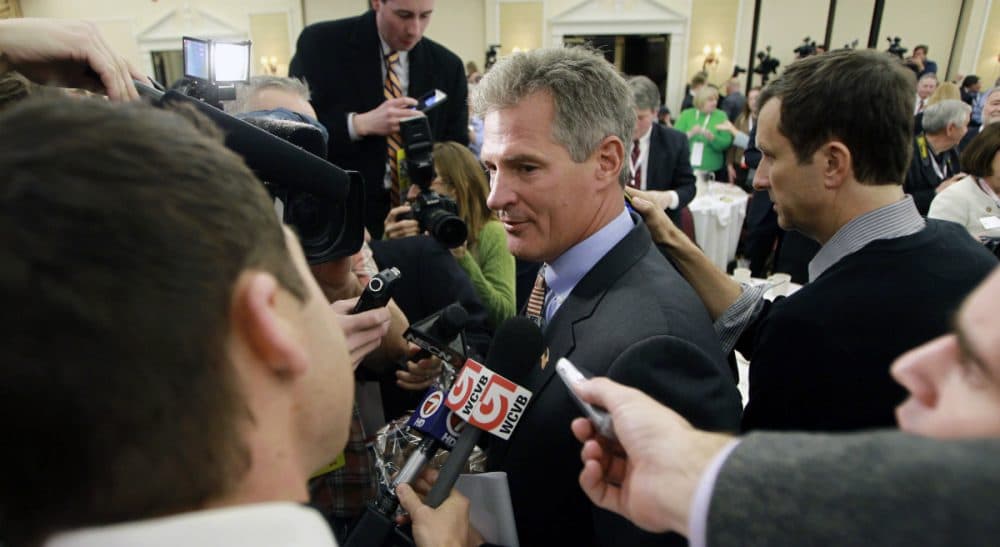Advertisement
What Is Scott Brown's Agenda Anyway?

Moultonborough decided not to install sidewalks in the village center. Atkinson agreed to fund a mosquito control program and Pelham rejected the purchase of a new fire truck. With town meeting season winding down in the Granite State, voters can turn their political attention from the concrete to the quixotic — Scott Brown’s decision to ditch Massachusetts for New Hampshire in order to get back to Washington.
It is a circuitous route, no matter how many summer vacations the former Bay State senator might have spent visiting his grandparents in Rye. The candidate who touted his Massachusetts roots in his unsuccessful re-election bid against Elizabeth Warren a mere two years ago is not going to convince anyone north of Methuen that he is really a son of New Hampshire.
But charges of carpetbagging won’t derail Brown’s run anymore than they did the U.S. Senate campaigns of Robert F. Kennedy in 1964 or Hillary R. Clinton in 2000 in New York. Political opportunism is a bipartisan principle. But love them or loathe them, Kennedy and Clinton had clear policy goals that went well beyond personal ambition. Beyond a reflexive renunciation of “Obamacare,” what exactly is the limelight-loving Brown’s agenda?
He believes in equal pay for equal work, he says, but during his brief stay on Capitol Hill he voted against the Pay Fairness Act. He represents the interests of the little guy, he says, but it was Wall Street that filled his campaign coffers in 2010 when he ran to fill the seat left open by Sen. Edward M. Kennedy’s death and Wall Street that he repaid by using his swing vote in the Senate to water down regulations of banks, private equity and hedge funds. He lives in a houseful of women, he likes to say, but he voted against requiring employers and insurers to pay for contraception coverage.
Brown’s charm offensive will take him only so far in New Hampshire, where people wear their barn coats to actual barns and drive their pickup trucks to actual job sites.
New Hampshire’s economy is stronger than many states with a seasonally adjusted unemployment rate last month of 4.7 percent, compared to a national rate of 6.7 percent. But jobs are concentrated in the southern tier, leaving pockets of poverty — and all the medical challenges that accompany it — throughout more rural areas.
If he defeats the other three candidates for the Republican nomination in September, Brown will certainly capitalize on the botched implementation of the Affordable Care Act in his attacks on Democratic Sen. Jeanne Shaheen, a supporter of the health care overhaul bill. But Brown will need to offer more than opposition. What is his plan to help the New Hampshire hospitals that provided more than $425 million in free care to the uninsured in 2012, up about 19 percent from $358 million the year before?
New Hampshire lawmakers recognize the urgency, moving closer this week to approving the use of federal Medicaid funds to buy 50,000 low-income residents private coverage through the Obamacare insurance exchange. Would Brown have them do otherwise?
Advertisement
Brown’s charm offensive will take him only so far in New Hampshire, where people wear their barn coats to actual barns and drive their pickup trucks to actual job sites. Jamming with the local band, as he did the other night in Berlin, reinforces what no one has ever disputed: Brown is a charismatic guy. More colorful certainly than his three GOP opponents, Brown would face a formidable opponent in Shaheen, the first-term senator who built a reservoir of goodwill and a solid track record during three terms as the state’s governor. It will be hard to characterize her as a tax-and-spend liberal when she maintained New Hampshire’s status as the state with the lowest tax rate in the country during her six years as governor.
It has been a busy few years for Brown. He toyed with running in Massachusetts in the special election to replace John Kerry when he left his Senate seat to become secretary of state. He flirted with a run for governor of Massachusetts. He visited Iowa repeatedly, fueling media speculation about some hubristic presidential bid. Now, he has turned his bedroom eyes to New Hampshire.
At a St. Patrick’s Day breakfast in Nashua, Democratic Gov. Maggie Hassan captured the skepticism Brown will face when he drops the Hamlet act and makes his candidacy for the U.S. Senate from New Hampshire official. “Scott Brown had intended to join us here this morning but he made an impromptu trip to Ukraine instead,” she said. “He heard there might be an election.”
Related:
